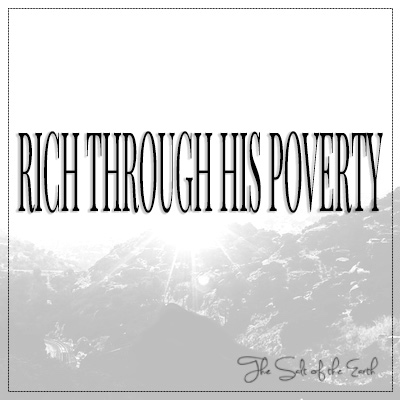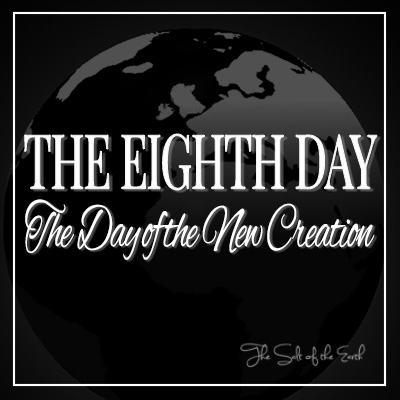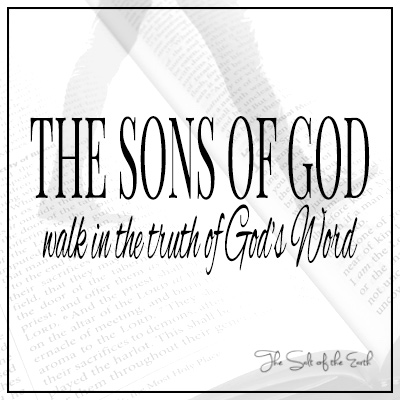There are many believers, who believe that a Christian can live under a curse. Ho theosa le dilemo, many books have been written about generational curses and curses in general. In these books, it is claimed that a born again Christian can live under a curse. These books provide methods and technics on how to find out what kind of curse is upon someone’s life and how to break the curse, so that the person will be redeemed from the curse. These books are very popular among believers. Since many believers do believe that they or others can live under a curse. But is that true? Can a Christian live under a curse or not? The generational curses le cursings, which are spoken over Christians are already discussed in previous blogposts. In this blogpost we shall discuss what a curse is and whether a born again Christian can live under a curse.
What is a curse?
People think, that if things in life don’t go according to the will of people or don’t go according as planned or expected, or if people experience resistance and are not prosperous, they live under a curse. But if that would be true, then many people in the Bible would have lived under a curse.
Because many prophets in the Old Covenant and sons of God (new creations) in the New Covenant, experienced setbacks, khanyetso, and/or persecution and were not prosperous and things in life didn’t turn out as they expected or wanted, and still they were blessed and God was with them.
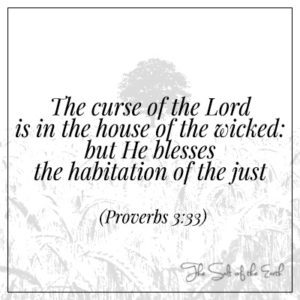 Ka hona, prosperity, success, and wealth in the world may never be an indicator whether a person is living right with God and live in His will and whether God is with a person or not.
Ka hona, prosperity, success, and wealth in the world may never be an indicator whether a person is living right with God and live in His will and whether God is with a person or not.
Because there are many people on earth, who are prosperous, successful, powerful, and wealthy and seem happy, but still live under a curse.
What is a curse? The curse, as described in the Bible came from God and not from the devil. The curse was the judgment of God, which came through disobedience to God; sebe.
Therefore man brought mischief; the judgment of God upon himself or herself by his own actions, through disobedience to God (sebe). Through disobedience to God, a person became separated from God and no longer lived under God’s protection (Bala hape: ‘The mischief people bring upon themselves‘).
Every other curse (a prayer or invocation for harm or injury to come upon one*) which is described as imprecation or a spell, doesn’t originate from the Bible, but from the occult and pagan religions.
In the occult and in pagan religions people believe in generational curses and that people can live under a curse. Ntle ho moo, they use words and natural means (objects) and/or rituals to curse people and/or to break curses.
Almost all doctrines about curses, which are taught to believers, mainly originate from the occult and pagan religions and not from the Bible (Bala hape: ‘Kereke ya boloi‘ le ‘Mongwaha o motjha kerekeng?‘).
The curse on mankind
From the moment that Adam and Eve became disobedient to the words of God and believed and obeyed the words of the serpent, and fell from their position and became separated from God, God cursed the serpent, mankind, and the earth (Oh. Genesis 3:13-19, Genesis 5:29).
The earth was cursed and would bring forth thorns and thistles. In the natural this referred to weeds, but in the spiritual this referred to the sons of the devil; sinners that the earth would bring forth instead of sons of God; the righteous.
Man was taken from the dust out of the ground and would return to the ground.
Motho e mong le e mong, who would be born of the seed of fallen man, would be born as a sinner and would live under the curse, under the authority of the kingdom of darkness, and would live in the bondage of sin and death.
God chose His people and blessed His people
All the nations that lived on the face of the earth lived under the curse. Among all those nations, God chose a people, whom He would set apart from all other nations and would sanctify. And so God chose Abraham and then Isaac and Jacob (Iseraele).
God made His will known to His people Israel, by giving them the law. As long as the people stayed obedient to God and kept the law and all the precepts, sacrifices, meetlo, le mekete, they were blessed, but if they decided to become disobedient to God and no longer kept the precepts, sacrifices, meetlo, le mekete, they became cursed and brought the judgment of God upon themselves and sometimes upon the whole congregation (Bala hape: ‘Se boleloang ke phula ea Akore ke eng?‘ le ‘What does the Word say about sin in the church?‘).
As long as the people loved God, feared God and trusted upon God, and remained obedient to God and His words, the people had nothing to fear, because God was with His people and His people lived under God’s protection.
The law was a schoolmaster and was intended for the carnal man; motho ya weleng, in which the sinful nature reigns and kept the people in custody until the promise of God would come, namely the coming of the Messiah (Bagalata 3:24-25).
The curse began at a tree and ended at a tree
Christ hath redeemed us from the curse of the law, being made a curse for us: for it is written, Cursed is every one that hangeth on a tree: That the blessing of Abraham might come on the Gentiles through Jesus Christ; that we might receive the promise of the Spirit through faith (Bagalata 3:13-14)
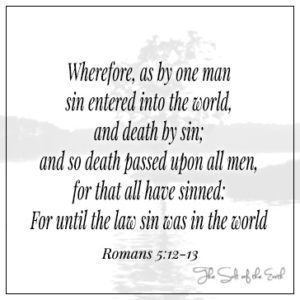 Adam took of the fruit from the tree of good and evil against the commandment of God, whereby through the disobedience of Adam the whole human race was cursed and lived under the curse, separated from God.
Adam took of the fruit from the tree of good and evil against the commandment of God, whereby through the disobedience of Adam the whole human race was cursed and lived under the curse, separated from God.
But God had a plan to redeem man from the curse and the power of sin and death and reconcile man back to God, so that man’s spirit would be connected with God again.
Le e mong oa bona, named Caiaphas, being the high priest that same year, said unto them, Ye know nothing at all, Nor consider that it is expedient for us, that one Man should die for the people, and that the whole nation perish not (Johanne 11:49-50)
Me, ea ba, the promised Seed; Jesu Kreste, the Son of the living God came to the earth to redeem mankind from the curse by taking the curse of the whole human race upon Himself and reconcile man back to God and restore the relationship between man and God (Bala hape: ‘The peace, Jesus restored between fallen man and God‘ le ‘Jesu o ile a khutlisetsa boemo ba motho ea oeleng‘).
Through the obedience of Jesus Christ, the curse has been broken
Therefore as by the offence of one judgment came upon all men to condemnation; even so by the righteousness of one the free gift came upon all men unto justification of life. For as by one man’s disobedience many were made sinners, so by the obedience of one shall many be made righteous. Moreover the law entered, that the offence might abound. But where sin abounded, grace did much more abound: That as sin hath reigned unto death, even so might grace reign through righteousness unto eternal life by Jesus Christ our Lord (Baroma 5:18-21)
Through the disobedience (sebe) of the first Adam (man), the curse came upon the whole human race and man became separated from God. But through the obedience of the last Adam (Jesu Kreste) the curse was broken and man was reconciled with God (Bala hape: ‘The disobedience to God‘ le ‘The obedience to God‘)..
Jesus took the curse of mankind upon Himself by becoming a curse at the cross and He gave to everyone the opportunity to be redeemed from the curse and no longer live under the curse by faith in Jesus Christ and through the identification in Hem, through regeneration.
The new man doesn’t live under the curse and the judgment of God
Ka baka leo, ha ho sa le tsuo ho ba leng ho Kreste Jesu, ba sa tsamayeng ka nama, empa kamora Moya. Hobane molao wa Moya wa bophelo o ho Kreste Jesu, o nkgolotse molaong wa sebe le lefu (Baroma 8:1-2)
Motho e mong le e mong, who believes in Jesus Christ and by faith in Him becomes a new creation; a new man, is reconciled with God.
The new man has received God’s nature and doesn’t live after the flesh under the curse by the power of sin and death in rebellion against God. But the new man is redeemed from the curse and lives after the Spirit in righteousness in obedience to the Word in harmony with God.
All things of the former life have been put away, by the crucifixion of the flesh and is under the blood of Christ, including the curse which came by original sin, which reigns in the flesh and all other curses, which man has brought upon himself or herself in his or her former life when (sh)he belonged to the kingdom of darkness. All curses have been done away by Christ and no single curse reigns in the life of the new man anymore.
Can a born again Christian live under a curse?
Che, a born again Christian, who has become a new creation and walks in obedience to the Word after the Spirit can’t live under a curse, it’s impossible. Since the flesh, in which the curse operates and reigns is crucified through the identification in Christ and is buried in water-baptism and no longer lives.
 When you have sokoloha from your former life as a sinner and have been born again in Christ, then Jesus has redeemed you from the curse, by becoming a curse for you at the cross.
When you have sokoloha from your former life as a sinner and have been born again in Christ, then Jesus has redeemed you from the curse, by becoming a curse for you at the cross.
If you love Jesus Christ and God the Father and do what He says, then it’s impossible to live under a curse. Because you are blessed by God.
Every curse or spell, which is spoken from the kingdom of darkness can’t touch you as a born again Christian, who belongs to the Kingdom of God, because you are blessed in Christ (Bala hape: ‘Can a Christian be cursed?‘ le ‘Na lithohako tsa meloko li teng?‘).
You are a son of God (sena se sebetsa ho banna le basali) and because of that, you shall walk as a son of God in righteousness in the armor of God. Therefore you are protected and no weapon that is formed against you shall prosper in your life and no curse, imprecation or spell shall be able to touch you and/or harm you.
But it’s all about, who and what you believe. Since you speak, ketso, and live according to what you believe. Do you believe God and His Word? Or do you believe people and people’s words?
‘Be the salt of the earth’
*Webster-Merriam dictionary
